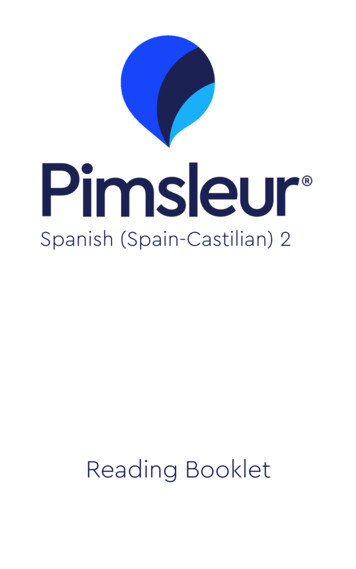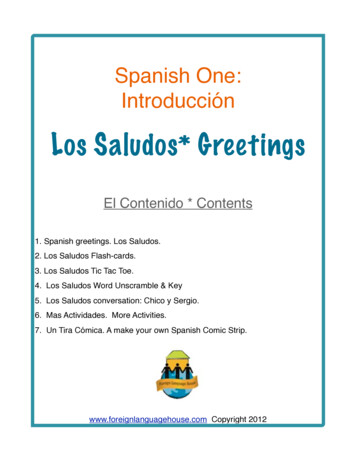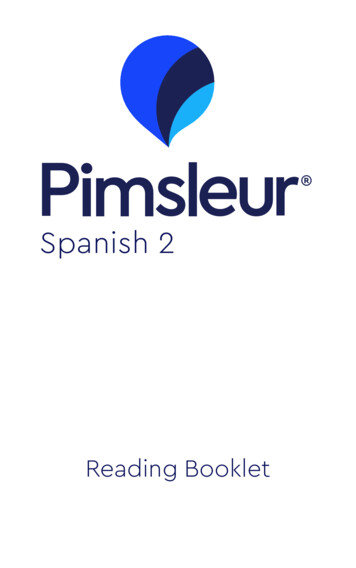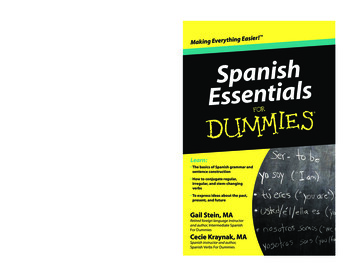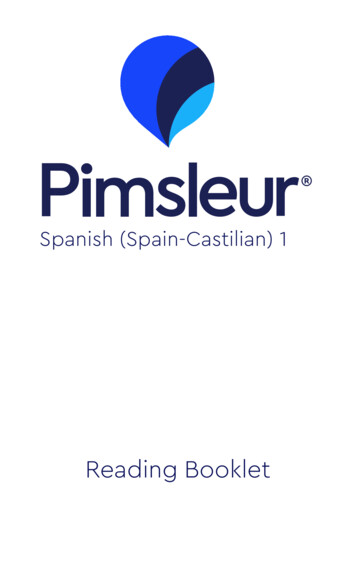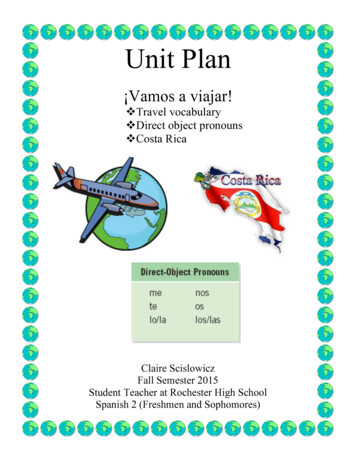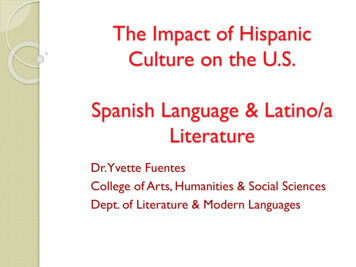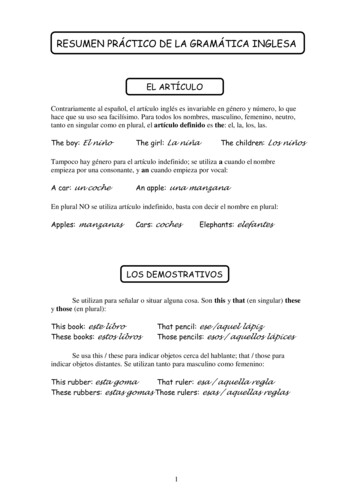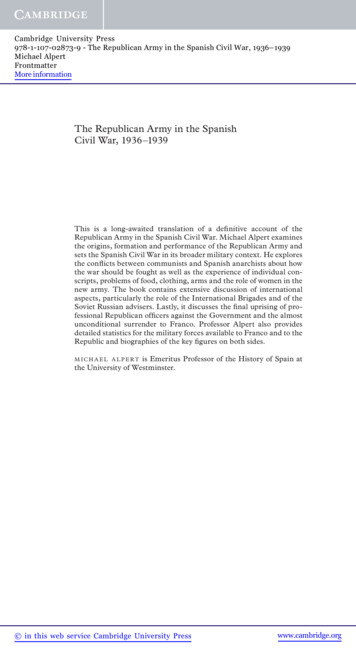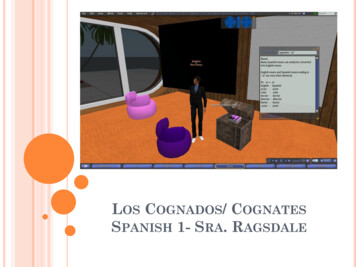
Transcription
LOS COGNADOS/ COGNATESSPANISH 1- SRA. RAGSDALE
What are cognates? Thereare some words in anotherlanguage that when you see them, youknow (or think you know) what theymean. They may be spelled exactly alike (orsimilar to) a word in your nativelanguage. For example, “capital” is spelledthe same & means the same thing inEng/Spa; however, it has differentpronunciation. Such pairs of words that exist in twolanguages are called “cognates”, from“cognatus”, the Latin word for relative. There are three types of cognates:exact, direct, and indirect
BUT BE AWARE THERE’S ONE MORE!!There are some words that look like or are spelled likewords in English; however, they have differentmeanings & pronunciations . These words are called false cognates or falsefriends. Look at these words: pan, once, pie, hay, sin If they’re English words, we know their meanings,right? But do we know them in Spanish? Can you guess these meanings at first glance?embarazada, sopaBut relax Only about 10 % of Spanish words are false cognates.
THREE TYPES OF COGNATES EXACT: Have same meaning and spelling in EnglishExamples: chocolate, hotel, idea, piano DIRECT:Have a direct and similar meaning and spellingto words in English. Examples: declaración, libertad, familia, especial,rápido, curioso INDIRECT: Have an indirect meaning and spelling to wordsin English. Example: Biblioteca library; “biblio” Latin for collection of books; la Biblia Bible
HOW DO COGNATES HELP US LEARN SPANISH?Spanish is a language that evolved from Latinover the last two thousand years. English, although it is not as closely related toLatin as Spanish, borrows thousands of wordsfrom Latin, many of them the same words thatSpanish uses. Both languages have borrowed many words fromClassical Greek. This results in thousands ofcognates between English and Spanish. Learning vocabulary of another language ismuch easier when you can recognize cognates. Simply use your knowledge of Englishvocabulary and apply the rules that determinethe spelling change between the two languages.
YOU CAN READ SPANISH, TOO!You may not know it, but if I tell you that “el” “the”, “hay” “there is/there are” “un” a, an I betyou can read and understand the meanings of thesesentences and understand them let’s try:1. El elefante es un animal inteligente.2. Hay elefantes en África.3. El camello es un animal diferente.4. Hay muchos camellos en el desierto.5. El tigre es un animal feroz.6. El león es otro animal feroz.7. Hay muchos animales feroces en el circo.
WHY AND HOW? Cognateshelp to Spanish beginners feel morecomfortable with this new language. Establishes a link between English andSpanish. Students are aware of the common origin ofwords. Allows students to explore the language farbeyond from school’s objectives.
WHY AND HOW?Activities for finding and using cognates Look for cognates in your textbook. Read magazines and newspapers in orderto find cognates Try to translate the main idea of aparagraph by identifying cognates that willhelp to understand its content. Want more practice? Visit this website http://www.quia.com/pages/cragsdale/8span1
PRONUNCIATION OF COGNATESMany words in English have nearly identical Spanish cognates. Only thepronunciation is different and, at most, a very little spelling ónmillónplazaradioregularsimilarteléfonovilla
SPELLING, SPELLING, SPELLING Spanish words that end in -a, -o or -e very often have anequivalent in English. With some, you simply drop or changethe last vowel.aireatleta (athlete)casocausacostocreativocreditodietadrama
COGNATES: SUFFIX RECOGNITIONThere are many Spanish cognates that end in -ción. Theequivalent English word ends in -tion. Note that all of thesewords have the stress on the final syllable. Also, all of thesewords are feminine in iónsituaciónventilaciónviolación
Words that end in -ary in English very often have aSpanish cognate that ends in –ario/ oliterarionecesario/aordinario/asalariovocabulario
Words that in in –dad/-tad are quite common inSpanish. They usually correspond to an Englishword that ends in -ty. All of these words arefeminine in gender.autoridad (authority)ciudad (city)comunidaddificultadenfermedad (infirmity, illness)formalidadvelocidad
English words that end in -ic usually have a Spanishcognate that simply add an �ctico/aescolástico/aromántico/asarcástico/a
Like the previous category, English words that end in ical have a Spanish cognate that ends in –ico/ �rico/ametódico/aperiódico �gico/a (psychological)técnico/a
English words that end in -ent often have a cognatein Spanish that ends in -ente. These words areusually renteinteligentesuficiente
KEEP AN EYE ON Spanish words that end in - mente (as opposed tojust -ente). They usually have an English cognatethat ends in -ly. These are adverbs.correctamentedesafortunadamente eneralmentemoralmenterapidamente
Words that end in -ment in English have equivalentsin Spanish that simply add an -o. These words tamento
Words that end in -al in both English and Spanishare often lgeneralhospitalintelectual
English words that end in -ence or -ance oftenhave a Spanish cognate that ends in -encia or ancia.abundanciaausencia (absence)circunstanciaconcienciadiferencia
-ant (or sometimes –ent )words in Englishsometimes end in -ante in ante
Some English words that end in -ous have a Spanishcognate that ends in so
English words with the ending -y sometimes have anequivalent in Spanish with the ending -ia or -io.aristocraciacompañía (company)democraciaeficaciafamiliafarmacia (pharmacy)historia
English words that end in -or often have a Spanishcognate that is identical.actorautor (author)colordirectordoctorhumor
English words that end in -ist often have a Spanishcognate that ens with –ista.artistafloristamoralistapianistaturista
PRUEBA PRACTICAHow do you say/write the following in Spanish?1. cost2. situation3. necessary4. university5. romantic6. hysterical7. different8. especially9. argument10. difference11. important12. famous13. family14. artist15. doctor
PRUEBA PRACTICAHow do you say/write the following in Spanish?1. costo2. situación3. necesario4. universidad5. romántico6. histérico7. diferente8. especialmente9. argumento10. diferencia11. importante12. famoso13. familia14. artista15. doctor
Latin as Spanish, borrows thousands of words from Latin, many of them the same words that Spanish uses. Both languages have borrowed many words from Classical Greek. This results in thousands of cognates between English and Spanish. Learning vocabulary of another
